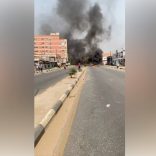Guinea-Bissau: Senegal 'will always stand by country' on security - president Faye
Portugal: Commission to investigate church sex abuse, try to uncover ‘tip of iceberg’

Photo: Jornal Txopela
Eight people make up, for now, the commission that will investigate decades of possible sexual abuse in the Portuguese Catholic Church, collecting accusations and delving into ecclesiastical archives and beyond, and that may only uncover the “tip of the iceberg”.
The numbers are an important part of the study that the Independent Commission for the Study of Sexual Abuse in the Portuguese Catholic Church intends to undertake in the “time arc 1950-2022”, but they may not even be enough to answer the question – which has “a very difficult answer” – and that is: “How many children were abused between 1950-2022?”, sociologist and researcher Ana Nunes de Almeida explained.
“The numbers of child abuse say little and we will never get out of the tip of an iceberg in which only a third is visible and another two thirds submerged in a deep sea,” she said at the press conference that on Monday publicly presented the six members – who have since been joined by another two – of the commission formed on the initiative of the Portuguese Bishops’ Conference (CEP), which is funding it.
The analysis of more than seven decades of possible sexual abuse will involve immersion in databases and historical archives of the Catholic Church, the Attorney General’s Office, the Commissions for the Protection of Children and Young People (CPCJ), the Portuguese Association for Victim Support (APAV), the Institute for Child Support (IAC), hospitals and health centres, among others, in addition to research in the press, seeking “evidence of facts that have occurred”. The analysis of newspapers and magazines, national and local, does not exclude the religious press itself.
“We want to know the reality of sexual abuse of children and adolescents practised by members of the Portuguese Catholic Church, or by lay people who are involved in its various areas of activity: parish, educational, school, family, therapeutic, etc”, said Ana Nunes de Almeida.
Documentary analysis will be one of the approaches used to pursue the objective, but the second strategy and “centre of gravity of the study” will be to “listen to the victims”, through surveys and interviews, through which testimonies and “experiences told in the first person” will be collected, analysed and interpreted”.
In the surveys there will also be space for victims to express themselves on what they understand would be a remedy for their case and there are questions on post-abuse, which aims to give victims the opportunity to report possible cover-up strategies.
“All victims of all ages, all testimonies count for us,” she said.
Ana Nunes de Almeida also mentioned the importance of understanding the social and historical context in which the abuse is said to have happened.
“The time period takes us through deep layers and changes and turning points in Portuguese society, especially in the post-April 25 period. A socio-historical contextualisation of the study is indispensable, as these cases do not happen in a vacuum. It is necessary to portray, on the one hand, the relationship of the Portuguese with the Catholic Church throughout these decades and its presence in society and, on the other hand, to also speak of processes of secularisation and individualisation, new representations and practices of sexuality, new values regarding children and childhood and gender roles. It is necessary to rebuild the background”, she said.
The commission’s work runs until 31 December 2022, but Ana Nunes de Almeida said that they only count on “systematically working” all the enquiries received up to 31 July, without this being an impediment for testimonies to continue to be received, and possibly even to be worked on.
In the view of the commission, which has adopted the motto “Giving voice to silence”, “we need to give people time to gather courage and testify”.
The commission, which has already gained two new members, admits that there may be a need to grow further according to the work it finds ahead.
“Very little, almost nothing, is known about sexual abuse of children in the Portuguese Catholic Church. We are entering almost in the dark into an unknown terrain, but we have no doubt that as we begin to excavate, we will be taken by surprise by other clues. Our path is precisely, and without any hesitation, to go after them”; said Ana Nunes de Almeida.













Leave a Reply
Be the First to Comment!
You must be logged in to post a comment.
You must be logged in to post a comment.